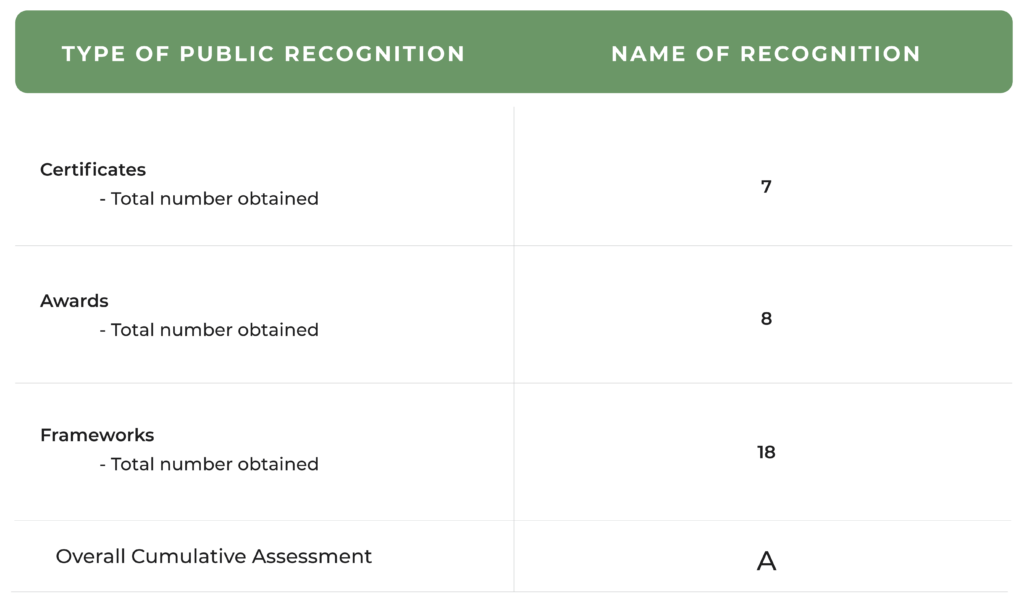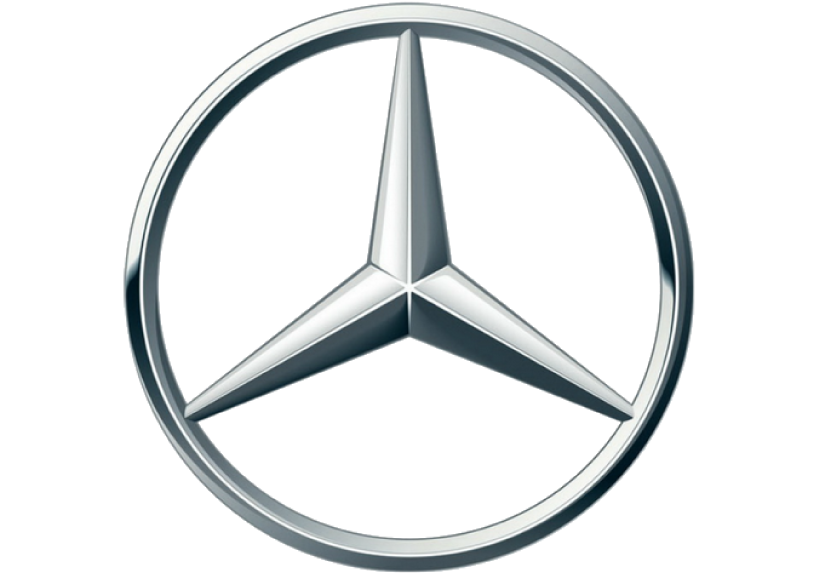
RATING

Positive.
On its way to a substantial improvement.
SECTOR
Automotive
Chief Sustainability Officer
Stock Exchange and Ticker
BIT: MBG
Website
Contact
E.mail: dialog@daimler.com
Listing
- N/A
Awards
- In May 2021, UBQ Materials and Mercedes-Benz AG received the Sustainability Award in Automotive 2021 in the “Best Startup” category.
- The international EFMD Excellence in Practice Award 2021.
- In May 2021, Benz was honoured with the Arts Sponsorship Award.
- Dark Green rating of CICERO.
- CDP climate rating system, A-rating.
- A-rating from MSCI.
- Leading position among the comparable group of automakers in Sustainalytics.
- Prime Status C+ from ISS ESG rating (Best possible rating in automotive sector).
Revenue
EUR 167.9 B
Market Capitalisation
EUR 58.852 B
Employees
172,425
Content source
Mercedes Benz Group – Sustainability Report 2021
Mercedes Benz Group – Annual Report 2021
Forbes
https://www.forbes.com/companies/mercedes-benz-group/?list=global2000&sh=51db65ed3312
Yahoo Finance:
Mercedes-Benz AG Sustainability Report
Evaluation of Mercedes Benz AG
Mercedes-Benz’s report outlines their sustainability initiatives, along with specific targets and progress made by the company. The company has more certificates, awards and listings compared to the previous year, and the automotive company produces a comprehensive report with specific targets and goals for reducing their CO2 emissions, energy consumption, waste, recycling, traffic safety, human rights, and raw material consumption in alignment with the UN Sustainable Development goals.
Their transparency as a company is noteworthy although they could have quantified their progress better, rather thnan using ‘according to the plan’, for some targets. Despite all their sustainability initiatives, Mercedes-Benz is also accused of greenwashing and faces a climate lawsuit for moving slow to an all electric model. Therefore, the company can be rated B but it’s on the negative side.
Sustainability Scorecard
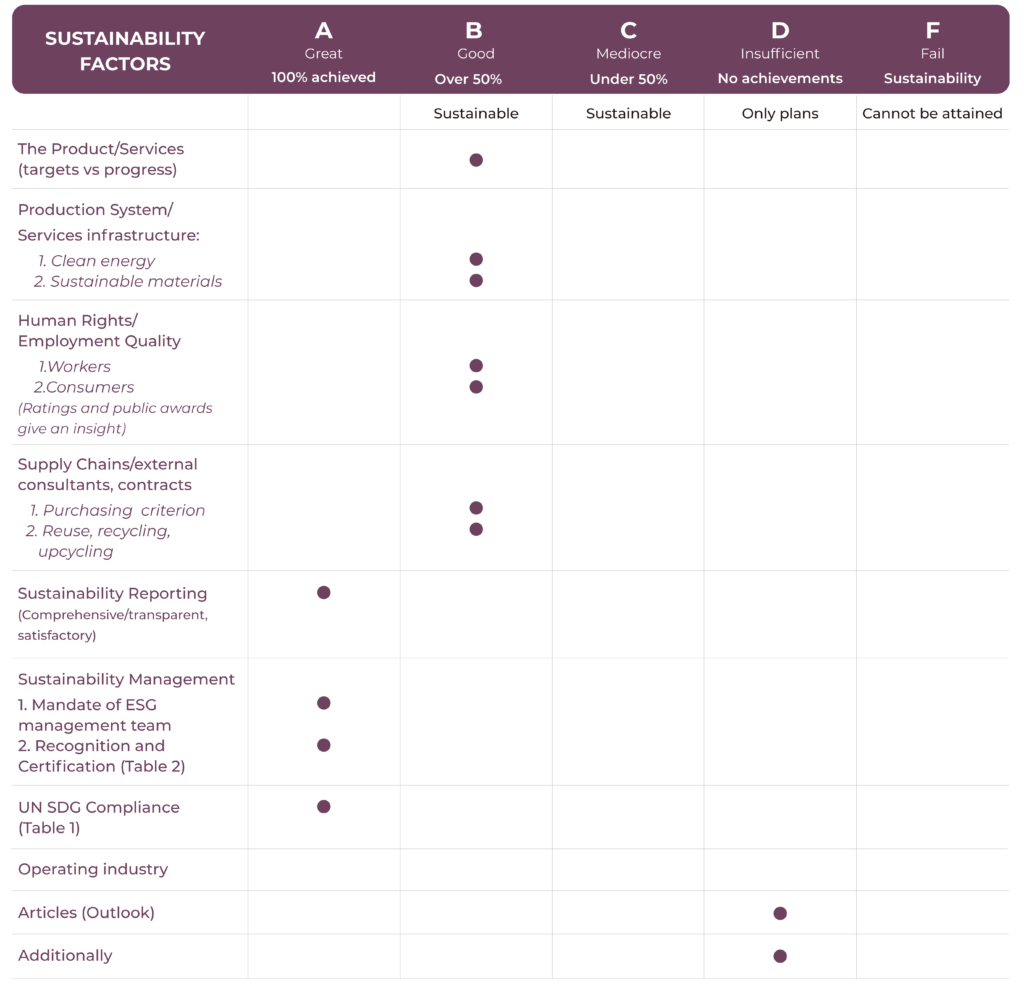
Mercedes Benz Company Activity
Mercedes-Benz Group AG is one of the world’s most successful automotive companies. With Mercedes-Benz AG, the Group is one of the leading global suppliers of premium and luxury cars and vans. Mercedes-Benz Mobility AG offers financing, leasing, car subscription and car rental, fleet management, digital services for charging and payment, insurance brokerage, as well as innovative mobility services.
Mercedes Benz Sustainability Activity - As per company declarations
For Mercedes-Benz, sustainability means permanently creating value for all stakeholder groups: for customers, employees, and investors as well as for their business partners and society as a whole. Economic, environmental, and social responsibility go hand in hand — along the entire value chain. In order to achieve long-term success, the company focus to live up to this responsibility. The company work together with their stakeholders on formulation of key issues and targets to monitor and adapt, to keep up with the latest sustainability developments in order to make sure that sustainability-related activities have a substantial effect.
Mercedes-Benz is a signatory member of The Climate Pledge, commiting to meet the goals of Paris Agreement on climate change and to become CO2 neutral by 2040. Additionally, Mercedes-Benz is a founding member of the international climate protection initiative Transform to Net Zero, working to improve the framework conditions for the decarbonisation of the economy and society worldwide.
Mercedes-Benz focus on the following:
Climate Protection and Air Quality: The company has a vision “An emission-free fleet of vehicles” , which drives their commitment to climate protection and air pollution control. Their ambition is to make their fleet of new cars CO₂-neutral by 2039 and to have no relevant impact on inner-city air quality.
Resource Conservation: The worldwide consumption of resources is growing – with negative consequences for the environment and society. Therefore, Mercedes-Benz’s goal is to increasingly decouple their consumption of resources from the growth of their production volume. The company intends to reduce their use of primary resources per vehicle which would help to promote both economic growth and sustainability.
Human Rights: For Mercedes-Benz Group, respect for human rights is a fundamental aspect of responsible corporate governance. It is their ambition and objective to ensure that human rights are respected in all their Group companies, by their partners and suppliers. Where appropriate, they also work together with various associations, organizations and competitors for the responsible procurement of raw materials.
Traffic Safety: Accident-free driving is the vision that drives the company and it is a fixed component of their sustainable business strategy. Mercedes-Benz’s innovative driving assistance systems already offer drivers and passengers a high level of safety and comfort today. These systems can help drivers avoid or safely manage critical situations on the road in order to protect vehicle occupants and other road users. System warnings and active brake applications are now increasingly mitigating the consequences of accidents or even preventing them altogether.
Data Responsibility: Connectivity and digitalization have a crucial role in future mobility. Large quantities of data are the basis for various new business models, including automated and autonomous driving, driving assistance systems, vehicle safety and new services. The company is committed to using data responsibly and at the same time, they focus on the needs of their customers. Mercedes Benz’s group-wide Data Compliance Management System helps them plan, implement and monitor measures to comply with data protection regulations in this process.
Certificate & Labels, Standards and Frameworks
- ISO 14001: Environmental Management and Responsibility
- ISO 22628: Method for calculating the recyclability rate and the recoverability rate of a new road vehicle
- ISO 50001: Energy Management and Efficiency
- ISO 45001: occupational health and safety management systems
- EMAS: management instrument developed by the European Commission for companies and other organisations to evaluate, report, and improve their environmental performance.
- EKOenergy environmental label: for their commitment to renewable energy
- FSC Certification for forest material supplied from responsibly managed forests.
- Gold Standard for the CO2 offsetting projects, compling with the Clean Development Mechanism
Standards and Frameworks:
- Global Reporting Initiative: Help organisations to publicly report the impacts of their activities in a structured way, transparent to stakeholders. Holds the company against NO clear rating system.
- CSR Directive Implementation Act (CSR-RUG)
- UN Global Compact
- Task Force on Climate-Related Financial Disclosures
- Sustainability Accounting Standards Board
- Carbon Disclosure Project
- World Business Council for Sustainable Development
- OECD Guidelines for Multinational Enterprises
- Core Labour Standards of the International Labour Organization (ILO)
- Advisory Board for Integrity and Sustainability
- Science Based Targets initiative (SBTi) on greenhouse gas (GHG) emission standards
- Greenhouse Gas (GHG) Protocol
- Corporate Average Fuel Economy standards (CAFE)
- Euro 6d standard
- Euro 6d-TEMP standard
- Clean Development Mechanism (CDM)
- ASI standard
- The Green Finance Framework of the International Capital Market Association (ICMA)
Mercedes Benz in the news: Press Reviews and Social Media
The following article accuses Mercedes-Benz of greenwashing by the sustainability platform WhereFrom and the advertisement agency 10 Days.
This article mentions the climate lawsuit against Mercede-Benz by and environmental group “Environmental Action Germany”. The group accuses Mercedes-Benz of not moving fast enough to an all electric model range.
https://www.drive.com.au/news/mercedes-sued-for-alleged-climate-inaction/
This article points out the innovative idea of Mercedes-Benz. They will be using mushrooms, cacti and bamboo as products for a sustainable form of leather for its vehicles.
https://sustainabilitymag.com/sustainability/how-will-mushrooms-make-mercedes-benz-sustainable
This article reports that secures €11 billion sustainability-linked loan tied to climate goals.
Highlights from Mercedes Benz Sustainability Report
Achievements
- In 2021, during the UN Climate Change Conference in Glasgow, Mercedes-Benz signed the COP26 Declaration on accelerating the transition to 100 per cent zero-emission cars and vans
- In 2021, Mercedes-Benz launched Green Charging in Europe, the United States and Canada, to offsest the energy used during charging with feeding energy from renewable sources into the grid.
- First all-electric luxury EQS sedan and the company’s first automobile with a structure derived from a modular electric architecture was launched in August 2021
- 78% of the total electricity consumed by the production of Mercedes-Benz Cars comes from renewable energy sources
- Make their new fleet of vehicles CO2 neutral by 2039
- Mercedes-Benz has made 89% of all suppliers CO2 neutral.
- Mercedes-Benz has reduced 85% CO2 emissions at its plants (Scope 1 and 2).
- Mercedes-Benz vehicles that comply with the emissions standard Euro 6d only have an extremely small effect on NO2 pollution in cities.
- Recycle raw materials as to conserve the resources.
- Assume responsibility to maintain human rights and develop a comfortable workplace.
Weaknesses and Setbacks
- Make their new fleet of vehicles CO2 neutral by 2039: the target is still far off in the future
- Automated driving is extremely resource intensive
Targets vs Progress Reported
| Target | Results reported |
|---|---|
| Vehicles and Sevices | |
| Mercedes-Benz offers battery electric vehicles (BEVs) in all the divisions in which the brand is represented by 2022. | Mercedes-Benz has made 10 models of battery electric vehicles (BEVs). |
| The company intents to increase the share of plug-in hybrids and all-electric vehicles to as high as 50% by 2025 | The company has increased the share of plug-in hybrids and all-electric vehicles by 12% |
| Mercedes-Benz targets to make all new vehicle architectures exclusively electric by 2025. | Mercedes-Benz mentions the target to make all new vehicle architectures exclusively electric by 2025, is going according to plan. |
| The company intents to offer customers the choice of at least one all-electric vehicle in every segment by 2025. | The company mentions the target to offer customers the choice of at least one all-electric vehicle in every segment by 2025, is going according to plan. |
| Mercedes-Benz aims to reduce the CO2 emissions of their fleet of new vehicles by more than 40% by 2030. | Mercedes-Benz mentions the target to reduce the CO2 emissions of their fleet of new vehicles by more than 40% by 2030, is going according to plan. |
| They aim to be all electric–wherever the market conditions allow, by the end of this decade. | The aim to be all electric– wherever the market conditions allow, by the end of this decade, the company underscored this fact during the UN Climate Change Conference in Glasgow in November 2021, when they signed the COP26 Declaration on accelerating the transition to 100% zero-emission cars and vans. In the declaration, the Mercedes-Benz Group was the only German automaker to confirm that it is working to offer only emission-free cars and vans in leading markets from 2035. |
| Achieve CO2 neutrality for new fleet of vehicles along all stages of the value chain by 2039. | The target to achieve CO2 neutrality for new fleet of vehicles along all stages of the value chain by 2039, is going according to plan. |
| Supply chain | |
| Increase the percentage of suppliers of CO2 neutral products to 90% by 2039. | 89% of all suppliers provide CO2 neutral products, measured on the basis of the annual procurement volume and assured by signature |
| Production | |
| Mercedes-Benz plans to make their manufacturing operations in their production plants CO2 neutral worldwide by 2022. | Mercedes-Benz’s plan to make their manufacturing operations in their production plants CO2 neutral worldwide by 2022, is going according to plan as per their sustainability report. |
| Mercedes-Benz intends to reduce CO2 emissions at its plants (Scope 1 and 2) by 50%, by 2030. | Mercedes-Benz has reduced 85% CO2 emissions at its plants (Scope 1 and 2). |
| Improving air quality | |
| Mercedes-Benz’s objective is to ensure that their entire new vehicle fleet no longer has any relevant impact on nitrogen dioxide pollution in urban areas, by 2025. | The current Mercedes-Benz vehicles that comply with the emissions standard Euro 6d only have an extremely small effect on NO2 pollution in cities. One point shown by the test data was that if every one of the 60,000 vehicles that pass the Neckartor in Stuttgart every day were replaced by a Mercedes-Benz vehicle with emissions standard Euro 6d, the NO2 emissions from the year 2019 would be reduced from 28 µg/m3 to below 2 µg/m3 . |
| Resource Conservation | |
| The company intends the proportion of secondary raw materials per vehicle on average for the Mercedes-Benz car fleet without smart and vans to be 40%, by 2030. | |
| Social | |
| Empower more than 70% of the employees to work successfully within the digital transformation by 2030. | The company achieved the milestone of empowering 60–65% of the employees to work successfully within the digital transformation by 2025. |
UN SDGs Compliance Analysis
Progress made toward SDG targets
As reported by Mercedes – Benz

Mercedes-Benz supports the implementation of humane working conditions by developing and implementing a risk-based management approach to respecting and upholding human rights in their own units and supply chain.
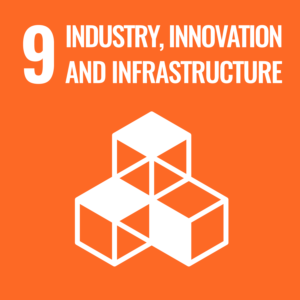
Mercedes-Benz is shaping the sustainable mobility of the future through digitalisation and electrification. Through the benefits the company expects from this process, for example in the areas of safety and climate protection, they are demonstrating the potential of digital innovations for our society.
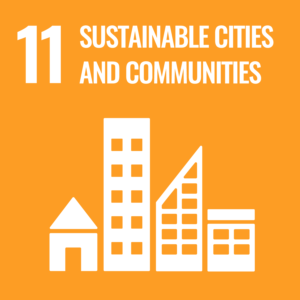
Mercedes-Benz is promoting sustainable mobility in metropolitan regions through its offers such as electrified shuttles, carsharing, ride hailing, and the multimodal linking of mobility services.

Mercedes-Benz is working to increase the efficiency of their vehicles and significantly reduce their use of raw materials. One of their tasks is to reinforce the closed material loops for the primary raw materials that are needed for their electric vehicles. In this way they are laying the groundwork for sustainable production patterns.

Through their sustainable business strategy and the associated measures and goals for reducing the emissions of their vehicles, plants, and supply chain, Mercedes-Benz is contributing to global climate protection.
Sustainability Certificates, Awards and Listings
